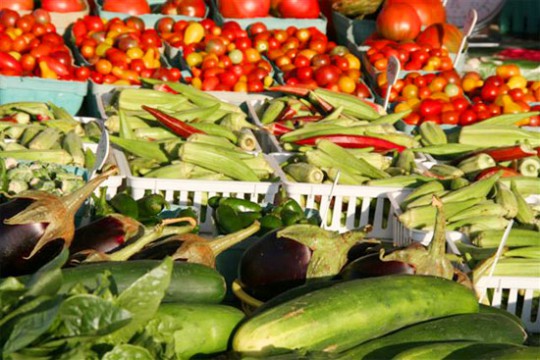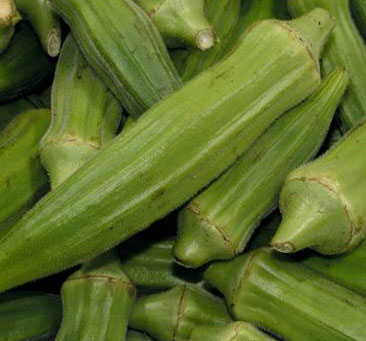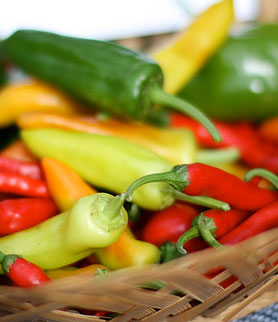Weekend Gardening: Some Veggies Can’t Take The Heat, But Others Thrive
July 21, 2012
When it comes to vegetable gardening in Northern Florida, gardeners should take advantage of our year-round growing season. Yes, even in the torrid depths of summer there are delicious, heat-tolerant vegetables you can plant now to keep your garden productive.
Popular vegetables such as tomatoes, beans, cucumbers and squash generally need warm-but-mild daytime temperatures – in the 70s and 80s – to produce well. The scorching heat we experience in midsummer seriously reduces the numbers of flowers these plants produce, and always remember that it is the flowers that ultimately become the fruit (vegetable). In addition, high populations of many pests, such as spider mites, leaf miners, beetles and caterpillars, are present now and will cause increasing amounts of damage through the summer.
Once they are past their prime and production dwindles, remove early summer vegetables and replant your garden with a wonderful selection of vegetables that thrive in midsummer heat.
The University of Florida – IFAS recommends a wide variety of vegetables that can be planted now. Most of these vegetables are near and dear to Southerners and form an important part of our regional cuisine. Among them are okra, eggplant, Southern peas, hot peppers, sweet peppers and more. It’s also a good time to start growing your own transplants for fall tomato production.
I’ve pulled out a few gardening vegetables that do well here but this is just the tip of the iceburg:
Native to tropical Africa, it never gets too hot for okra to thrive here. Direct-seeded into the garden now, okra will come into production in late August or early September (even sooner if you plant transplants) and produce until the weather cools down in late October or early November.
Reliable okra varieties include Clemson Spineless, Cajun Delight, Emerald and Burgundy.
A common mistake gardeners make is growing okra plants too close together. Once the okra seedlings are a few inches tall they should be thinned to provide 12 inches of space between plants.
When the plants are about knee high to waist high they begin to produce their pale yellow, hibiscus-like flowers. Harvest okra pods frequently when they reach a length of about 3 inches for best quality, although some varieties stay tender if harvested when the pods are larger.
Eggplant
Unlike their relatives, the tomatoes, eggplants thrive in the heat of mid- to late summer, and you can purchase transplants to plant into the garden now.
I generally have found the oriental types, such as Ichiban or Tycoon with long, narrow fruit are especially productive during stressful summer weather. Large-fruited cultivars such as Blackbell, Classic, Midnight and Florida Hi Bush, as well as green, white, lavender and pink cultivars also are recommended.
Plant eggplant transplants 18 inches to 24 inches apart in well-prepared beds. Production should begin in early September and increase through late October or early November.
Do not go by the size of the fruit when harvesting eggplants. Eggplants are eaten immature and should not be allowed to become old and bitter before harvest. The skin should be shiny and tender. Once the skin starts to dull you should harvest the eggplant immediately – no matter what the size – because that indicates it is getting past its prime.
Legumes
Although it is too hot for reliable production from legumes like snap beans and lima beans, Southern peas such as purple hulls, crowders, cream peas and blackeye peas produce abundant crops during the summer.
Direct-seed these peas in rows about 18 inches apart, and thin young seedlings to stand 4 inches to 6 inches apart. Most cultivars produce short, somewhat bushy vines and do not require a trellis to grow on. Other legumes that could be planted now include yard-long beans, winged peas (these need trellises to grow on) and edible soybeans.
Bell peppers often produce poorly during high temperatures, but hot peppers and sweet peppers such as Sweet Banana, Gypsy and Pimento produce very well despite the heat.
Plant transplants now spaced about 18 inches apart. Bell pepper transplants also can be planted now through August for production this fall when the weather cools down.
Tomatoes
Spring-planted tomatoes are about finished with their main crop, and if the plants are in poor condition, they should be removed to make way for heat-tolerant crops. On the other hand, cherry and Roma types may still be producing well and could be left in place.
If you want to grow your own transplants for fall tomatoes, seeds should be planted now. Transplants for fall tomatoes will be available at area nurseries in late July and August and should be purchased and planted into the garden then. Good cultivars for fall production include Hawaiian Hybrid, Solar Set, Heatwave, Bingo, Celebrity and Pelican.
Others
Other heat-tolerant vegetables that may planted now include cantaloupe, pumpkin, watermelon (these three are a bit of a challenge in the home garden), peanuts (easy to grow and a great crop for kids) and sweet potatoes (plant rooted cuttings or “slips” as soon as possible for harvest in November).







Comments